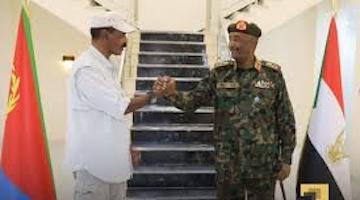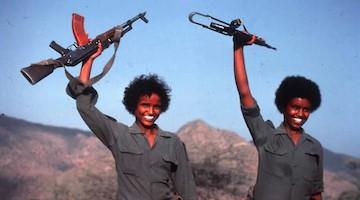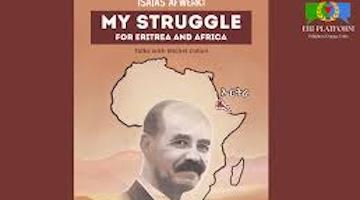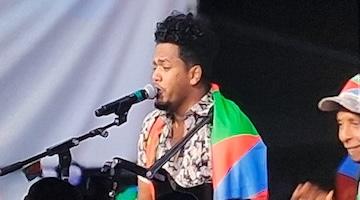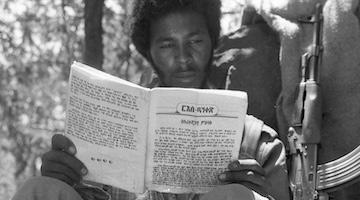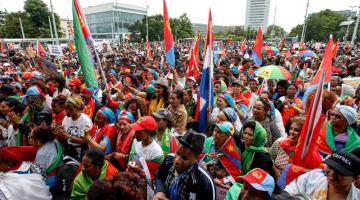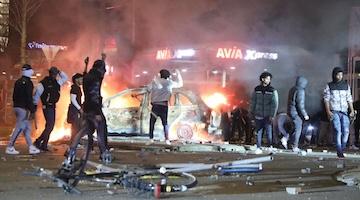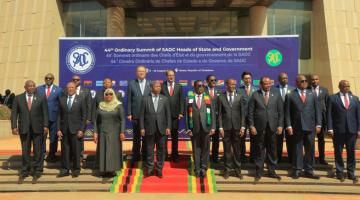Eugene Puryear, author Ann Garrison, Rania Khalek, Dr. Simon Tesfamariam at the 48th annual Eritrea Festival in Dallas. (Photo: Twitter @SebleTsehaye)
I had the honor of being invited to address the annual Eritrean Festival, which was held in Dallas this year during the first week of August. These are my remarks.
Greetings. Thank you for inviting me and imagining that I might have something to say. I had the great pleasure of visiting Eritrea in April and I love it. I’m going to say more about why later.
First I want to say that I was a little daunted to be stepping into Glen Ford’s shoes here, since he was the last person from Black Agenda Report to address the festival. A friend of mine said, “Well, they’re such huge shoes that at least you’ll be comfortable.”
No one’s ever going to fill those shoes. Glen predicted everything happening now in a speech at the Left Forum that’s now featured on the Black Agenda Report website, and I’ll be talking about some of what he said.
Like Glen and other Black Agenda Report editors, I don’t think that Europeans and European institutions are the pinnacles of human civilization that have to be rammed down the rest of the world’s throats at pain of death.
Europe has had its moments—rights of man and all that—but that’s all been overwhelmed by capitalism and militarism. Now the rights of man, what we now call human rights, have become an excuse for the US and its NATO allies to bomb and bust up Yugoslavia, bomb Libya to smithereens, bomb Syria and support jihadis there, back color revolutions like that in Ukraine, sanction a third of the world including Ethiopia and Eritrea, and do their best to dominate not only the whole planet but even outer space. Space Command is the newest of the US geographic commands.
The Empire’s in decline nevertheless, so we all just have to pray that it doesn’t take all the rest of us down with it.
When Glen spoke at the Eritrean Festival in 2012, he talked about US intervention and the militarization of Africa and most of what he said still holds true although I think the African Union has been doing more to stand up to the West since that time. They refused to invade Burundi in 2015 at the US and the rest of the West’s behest, and now they’re refusing to interfere in the Ethiopian civil conflict because that would violate Ethiopia’s sovereignty.
I’m going to talk about US sanctionmania and sanctioning the Horn of Africa, with a few twists and turns before I get to the pending sanctions bills, House Resolution 6600 and Senate Bill 3199. I’m a member of the Sanctions Kill Coalition, and I’m working on an essay about sanctioning the Horn for our upcoming Sanctions Kill Anthology.
Sanctions seemed like an abstract subject for many before the US proxy war with Russia in Ukraine and the sanctions on Russia suddenly made them as vivid as they are now. I myself didn’t know many of the details about how badly US sanctions are injuring people all over the world until I joined the Sanctions Kill Coalition and produced a couple of Pacifica Radio hours on the subject. I’m hoping to do a Part III of the Sanctions Kill series soon with a lot of emphasis on sanctioning the Horn.
I think it’s pretty obvious by now that the sanctions on Russian oil, gas, fertilizer, and whatever else are backfiring. The Russian ruble’s surging, Europe’s suffering, and they’re not even facing winter without Russian gas yet. As Glen Ford predicted in 2014, Russia and China and allies came closer together and began establishing an alternative to the US controlled swift system for international transactions as soon as the sanctions went into effect. And mid-level powers like Venezuela and Iran are developing stronger relations with one another and with Russia and China.
That doesn’t mean it’s smooth sailing. The US has intervened particularly in Iran’s efforts to work with Venezuela. Venezuela has the largest oil deposits in the world, but they’re suffering a severe fuel shortage. They haven’t been able to refine their oil because they can’t get parts for their refineries, and because their oil is heavy crude that needs to be mixed with light crude, which Iran has, in the refining process.
Iran has sent several tankers to Venezuela with light crude and emergency fuel supplies, and several of them got through, despite unprecedented US military presence in the Caribbean. However, one carrying $40 million worth of oil or fuel was intercepted by the U.S. Navy and the U.S. just kept it, like it’s kept all Venezuela’s oil properties in the U.S. and its gold in the Bank of London.
Sanctions Kill interviewed a Korean American doctor who teaches at Harvard Medical School. He said he volunteers every year in North Korea and that they have to wash and reuse every bit of gauze and every face mask until they’re absolutely unusable.
Eritrea has set a great example in standing up to totally unjustified UN sanctions, particularly UN sanctions based on a thoroughly untrue and implausible assertion that it had something to do with the Somali terrorist group Al Shabaab.
Here inflation has become such a scourge that Biden’s Democrats are going to get clobbered in November, and that means he’ll be weakened, even if the Democrats manage to hang onto the Senate by a seat. Imperialism is ultimately a bi-partisan project, but Biden and his team’s foreign policy in the Horn has been so much more aggressive than Trump’s that I’m sure no one will be sorry to see him and the rest of the Democrats weakened by his recklessness in Ukraine.
One good ancillary outcome of the Dems getting clobbered will be that Ilhan Omar, the Somali American Congresswoman from Minnesota, will not succeed Karen Bass, another arch imperialist, as Chair of the House Foreign Relations Subcommittee on Africa. If you read my piece about Ilhan Omar in the Grayzone, or if you’ve just paid any attention to what she does on that committee, you’ll know that she did everything she could to remove Somali President Mohammed Abdullahi Mohammed, aka Farmaajo, from office and replace him with someone already proving to be an ally of the US, Egypt, and Al Shabaab. This of course knocked out Somalia, for now, as one of the pillars of the Tripartite Alliance between Ertirea, Ethiopia, and Somalia, though I don’t think we’ve seen the last of Farmaajo or the popular forces that backed him. The Tripartite Alliance clearly represented more peace and independence than the US was willing to tolerate in the Horn.
I was a guest in a Twitter space organized by Somali Americans and even including some Somalis who joined us in the wee hours of the morning from halfway around the world. They were all screaming at me about what the US has done to them till I finally said, “I know. I know that the US is a very bad actor in Somalia. I’ve said that the US is a very bad actor there in everything I’ve written about Somalia.” But they couldn’t stop, so I accepted that it was my job to do penance for my government and just listen, and I learned a lot. One important thing I learned in that meeting was that there’s a Green Zone in Somalia, like the Green Zone in Iraq.
A contributor to Foreign Policy, hardly a radical publication, wrote this about the Green Zone in Somalia:
"As a compound dominated by the African Union Mission in Somalia (AMISOM) soldiers, mostly from Uganda, and a network of guerrilla diplomats who respect no diplomatic boundaries and which is infested with economic hitmen, foreign intelligence, counter-intelligence, counter-insurgency and counter-stability agents ( mercenaries) Halane—[that’s the Green Zone]—became a mega bazaar for political exploitation and zero-sum trade."
I asked why Somalia had to put up with a Green Zone inside its borders, and they all answered, “GOOD QUESTION.”
As Glen said at this festival in 2012, the US has already firmly planted itself in Somalia, where AMISOM, the African Union mission that’s supposed to be fighting Al Shabaab, is in fact a US operation, funded and armed by the US—with a bit of help from Europe—and under US command. And it’s far from clear that the US really wants to fight Al Shabaab, which is its excuse for being there, just like the jihadis that the US is actually supporting in Syria.
It’s no secret that the US has been killing nomads and farmers, then saying it killed Al Shabaab militants. Even Amnesty International—not my favorite organization—has been calling the Pentagon out about that.
The recent Al Shabaab incursions into Ethiopia also took place shortly after Farmaajo was removed from power, and that immediately made me worry that they could become an excuse for bombing Ethiopia. The US is not going to give up on the Horn easily.
Farmaajo had negotiated a 2025 departure date for AMISOM, and he had 5000 Somali troops training in Eritrea so that the country could handle its own defense. The biggest thing in the way of that was probably the arms embargo on Somalia. House Resolution 6600 and Senate Bill 3199 would impose arms embargoes on Ethiopia and Eritrea in an attempt to make them unable to defend themselves. More on that later.
As soon as Farmaajo was out, Biden announced that he’s sending US troops back in, and a US firm’s attempt to grab Somali oil and gas that Farmaajo had blocked was back in play. I can’t say where all this is headed, but again, I don’t think Farmaajo and the popular forces who rallied behind him are going away.
Getting back to Ilhan Omar, she has been equally aggressive with regard to Ethiopia and Eritrea, supporting the TPLF from day one. But, when the Democrats get clobbered, Republican Chris Smith of New Jersey will become the next Chair of the House Foreign Relations Subcommittee on Africa.
A Rwandan friend of mine who’s spent a lot of time lobbying and testifying before that committee says that’ll be a big improvement. It’s obviously not going to bring down the Empire, but it could create a little breathing room. I still need to look into whether or not he’s had anything to say about H.R. 6600, the House bill to sanction Ethiopia and Eritrea, but he’ll definitely be one to lobby as soon as the November elections are over.
Now, getting back to sanctions, and sanctions on the Horn in particular. I imagine you all know that the first round of sanctions didn’t injure Eritrea because you weren’t benefiting from the African Growth and Opportunity Act, otherwise known as AGOA. And your government or military officials don’t have looted assets stashed abroad or a burning desire to travel in the West. Similarly, Eritrea will not be affected by sanctions on loans from the International Monetary Fund or World Bank because you cut those umbilical cords a long time ago. As President Isaias has said, “Aid is like a drug. Keep taking it and pretty soon you’ll be addicted.”
Those sanctions did and will hurt Ethiopia, most particularly the cancellation of the African Growth and Opportunity Act, which allowed firms manufacturing in Ethiopia to import goods to the US tariff free. This has cost thousands of Ethiopians, mostly women, their jobs, in many cases their first jobs in the money economy, and that illustrates the nature of US sanctions. Most of them are meant to make working people so miserable that they’ll rise up and overthrow their government. It hasn’t worked in Venezuela, Cuba, Russia, China, or Eritrea and hopefully it won’t in Ethiopia.
Eritrea has already demonstrated its iron will to stand up to sanctions, so I’m not really worried about Eritrea, but it could get very rough if the pending House and Senate bills to sanction Ethiopia and Eritrea pass.
The bills are almost identical, and they’re both bipartisan, sponsored by Republicans and Democrats, demonstrating again that imperialism is a bipartisan project, although both were introduced by Democrats. Tom Malinowski introduced the House bill, H.R. 6600, and it’s sponsored by one more Democrat and two Republicans. Robert Menendez, a Democrat, introduced the Senate bill, S. 3199, and it’s sponsored by two more Democrats and two Republicans.
Now the only significance of this is that Democrats feel more obliged to support a bill introduced by a Democrat, so when the Democrats get clobbered in November, there may be less pressure to pass the Malinowski bill. Again, that’s not going to bring down the empire, but it could mean some breathing room.
The bills demand, in short, the total capitulation of the Ethiopian government. H.R. 6600 says that the sanctions will be lifted only after: “(1) The Government of Ethiopia has ceased all offensive military operations associated with the civil war and other conflicts in Ethiopia.”
In other words, the Government of Ethiopia and its army are all supposed to surrender to the US and the US has made it clear since the beginning of the Ethiopian conflict that it thinks the TPLF has a right to what both the US and the TPLF call Western Tigray, but Amhara Ethiopians call Welkeit.
I have been to Welkait. I was there for the press conference when University of Gondar researchers announced their findings about decades of TPLF massacres and atrocities committed against Amhara people there. So far I’m the only Westerner I know of who has reported this story which so runs counter to all the Amnesty International and Human Rights Watch reports that Amhara people have been committing crimes against Tigrayan people since the TPLF started the war. There is, however, a documentary called The Tears of Welkait.
I believe that Prime Minister Abiy knows that he cannot surrender Welkait to Amhara without a bloodbath, but I frankly don’t know how the US imagines that Welkait could be returned to the TPLF.
Another demand in the US sanctions bills is that once imposed, they won’t be lifted until: “(5) The Government of Ethiopia has cooperated with independent investigations of credible allegations of war crimes, crimes against humanity, and other human rights abuse carried out in the course of the civil war and other conflicts in Ethiopia.”
The summary of H.R. 6600 says, “Within 90 days of this bill's enactment, the State Department must report to Congress a determination of whether actions in Ethiopia by the armed forces of Ethiopia and Eritrea, the Tigrayan Peoples Liberation Front, and other armed actors constitute genocide, war crimes, or crimes against humanity.”
According to international law, only the UN Security Council can determine that war crimes, crimes against humanity, or genocide are taking place, then refer cases to the ICC for prosecution and/or organize a multilateral force to stop them, but US policymakers claim this right for themselves.
Ilhan Omar, on the House Foreign Relations Subcommittee on Africa, keeps asking when the State Department will hand them a “determination” of genocide, something US policymakers use to justify anything, including even bombing campaigns, as in Libya and Syria. Hopefully that won’t happen, but we need to be aware of the worst potential in these sanctions bills and why we have to stop them.
As I said, both bills would impose arms embargoes on Ethiopia and Eritrea, making it difficult for them to defend themselves. If they do pass, the question will be, however, whether or not other nations will respect them. Russia and India are trading with one another, using ships known to transport arms, and this is just one instance in which the rest of the world is refusing to respect U.S. sanctions.
The same is true of secondary sanctions, which would impose sanctions on other nations and corporations investing in Eritrea and Ethiopia. These have the potential to do a lot of damage because both Eritrea and Ethiopia need as much foreign investment as they can get to develop their resources. And note I said investment, not exploitation.
The big question with investment in Africa is what kind of a deal African nations are going to demand, and Eritrea has, as with standing up to sanctions, set a stellar example for the rest of Africa by demanding and getting roughly 50-50 deals for resource extraction contracts.
One example of this is the Bischa Gold Mine, which a Canadian mining firm was planning to develop with financing from a German corporation. Eritrea demanded a 50-50 deal, but the US bullied the German finance corporation into backing out. A Chinese corporation then financed the deal and a Chinese corporation ultimately purchased the Canadian mining corporation’s share.
This is an example of the world’s other major industrial and military powers collaborating with mid-level powers to stand up to bullying and aggression by the US. Hopefully they will refuse to respect secondary sanctions as well.
Finally, and this is the pending sanction I’m most worried about. The bills propose that the US work with social media giants to restrict speech in Ethiopia and Eritrea. H.R. 6600 says, specifically:
“The strategy required by subsection (a) shall include a plan to implement the strategy, including to—combat hate speech and disinformation in Ethiopia, including efforts to coordinate with social media companies to mitigate the effects of social media content generated outside of the United States focused on perpetuating the civil war and other conflicts in Ethiopia, including through hate speech and language inciting violence.”
This attempt to restrict speech on social media in other nations is unprecedented, and I’m most worried about this one because we don’t yet have alternative platforms the size of Twitter or Facebook. Twitter and Facebook are of course huge business empires, so the US government isn’t going to shut them down, as it has some independent outlets, but we could have all our social media networks for communicating and organizing destroyed any day or time.
Several of the US founders of the #NoMore movement, including Dr. Simon Tesfamariam and Nebiyu Asfaw have already been banned from Twitter, as has @HornOfAfricaHub and several other accounts associated with the #NoMore movement and its founders. The Atlantic Council even wrote up a statement about how dangerous Dr. Tesfamariam is.
So this is all the more reason why we have to stop House Resolution 6600 and Senate Bill 3199. That’s our job here in the US and if anyone would like to work on this with the Sanctions Kill Coalition, please start by visiting sanctionskill.org.
I had the pleasure of visiting Eritrea in April, and I love it. As I told people when I came home, “It’s so relaxed. Infectious childhood diseases have been all but eliminated. You don’t see extreme wealth or poverty. You don’t see people begging or sleeping in streets. People look happy.
The ministers are modest people working in modest offices who seem truly committed to building the country. I especially enjoyed talking to Yemane Meskel, the Minister of Information, and Economic Affairs Officer Hagos Ghebrehiwet. Mr. Hagos seems to be the chief development strategist and I am so impressed by Eritrea’s development strategies. I loved seeing all the urban gardens in Asmara, all the gardens and farms along the highways, and all the irrigation dams and ponds.
As Glen Ford said at your 2012 festival, Eritrea’s path to independence and self-reliance has been a glorious one. You have a glorious past, a glorious present, and hopefully a glorious future.
Thanks again for inviting me to be part of your Eritrean Festival. I love Eritrean music and I’m looking forward to the final dance party.
Ann Garrison is a Black Agenda Report Contributing Editor based in the San Francisco Bay Area. In 2014, she received the Victoire Ingabire Umuhoza Democracy and Peace Prize for her reporting on conflict in the African Great Lakes region. She can be reached at ann(at)anngarrison.com.

